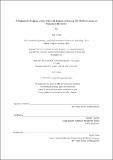A statistical analysis of the potential impact of Boeing 737 MAX crashes on passenger behavior
Author(s)
Zhang, Zhe,S.M.Sloan School of Management.
Download1191228764-MIT.pdf (780.9Kb)
Other Contributors
Sloan School of Management.
Advisor
Arnold I. Barnett.
Terms of use
Metadata
Show full item recordAbstract
There were two fatal air crashes in 2018 and 2019, Lion Air Flight 610 and Ethiopian Airlines Flight 302; aircraft type of both crashes was Boeing 737 MAX 8. In the aftermath of the two crashes, the Boeing 737 MAX 8 was grounded globally. According to the latest announcement of the Federal Aviation Administration (FAA), the MAX will be grounded until the summer of 2020. After the grounding, the MAX will return to the fleets of airlines in North America, such as American Airlines and Air Canada. However, will travelers accept this aircraft type as before? Or, to what extent travelers will avoid flying the MAX? The purpose of this thesis is to use statistical methods to quantify travelers' avoidance of MAX. Based on the booking data of American Airlines (AA) and Air Canada (AC), I use three metrics to measure travelers' attitudes, including bookings of the targeted flights, total daily bookings, and the proportions of bookings. The findings of the current study on two routes of AA and AC didn't reveal any statistically significant evidence of MAX avoidance on any of three key metrics. Accordingly, I concluded that the specific customer segment in this thesis didn't show a clear avoidance of MAX.
Description
Thesis: S.M. in Management Research, Massachusetts Institute of Technology, Sloan School of Management, May, 2020 Cataloged from the official PDF of thesis. Includes bibliographical references (page 47).
Date issued
2020Department
Sloan School of ManagementPublisher
Massachusetts Institute of Technology
Keywords
Sloan School of Management.